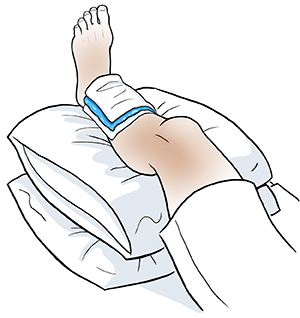Treatment for Bone Bruise (Bone Contusion)
A bone bruise is an injury to a bone that is less severe than a bone fracture. Bone bruises are fairly common. They can happen to people of all ages. Any type of bone in your body can get a bone bruise. Other injuries often happen along with a bone bruise, such as damage to nearby ligaments.
Types of treatment

Treatment for a bone bruise may include:
-
Resting the bone or joint
-
Putting an ice pack on the area several times a day
-
Raising the injury above the level of your heart to reduce swelling
-
Taking medicine to reduce pain and swelling
-
Wearing a brace or other device to limit movement
Your healthcare provider may give you advice about your diet. This is because eating a diet that is rich in calcium, vitamin D, and protein can help you heal. Your provider may ask you not to use certain over-the-counter medicines for pain. Some of these may delay normal bone healing. If you smoke, your provider will advise you to stop smoking. Smoking can also delay bone healing.
Your healthcare provider will tell you how long you should not put weight on your bone. Most bone bruises slowly heal over 2 to 4 months. A larger bone bruise may take longer to heal. You may not be able to return to sports activities for weeks or months. If your symptoms don’t go away, your provider may order an MRI (magnetic resonance imaging) scan.
Possible complications of a bone bruise
Most bone bruises heal without any problems. If your bone bruise is very large, your body may have trouble getting blood flow back to the area. This can cause avascular necrosis of the bone. This leads to death of that part of the bone.
When to call the healthcare provider
Call your healthcare provider if your symptoms don’t start to get better in a few days. Call them right away if you have any severe symptoms, such as a high fever.
Online Medical Reviewer:
Raymond Turley Jr PA-C
Online Medical Reviewer:
Rita Sather RN
Online Medical Reviewer:
Thomas N Joseph MD
Date Last Reviewed:
10/1/2024
© 2000-2026 The StayWell Company, LLC. All rights reserved. This information is not intended as a substitute for professional medical care. Always follow your healthcare professional's instructions.